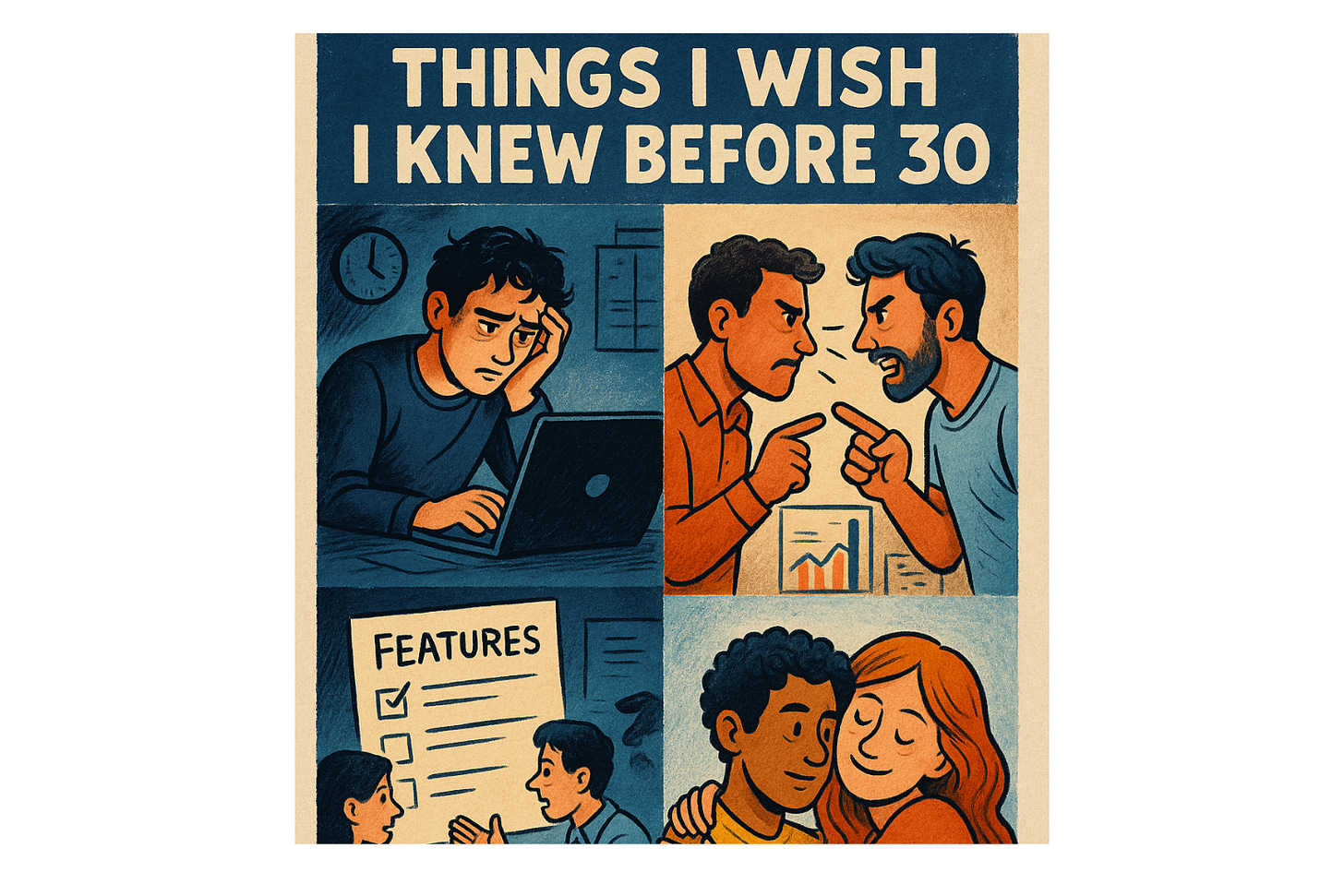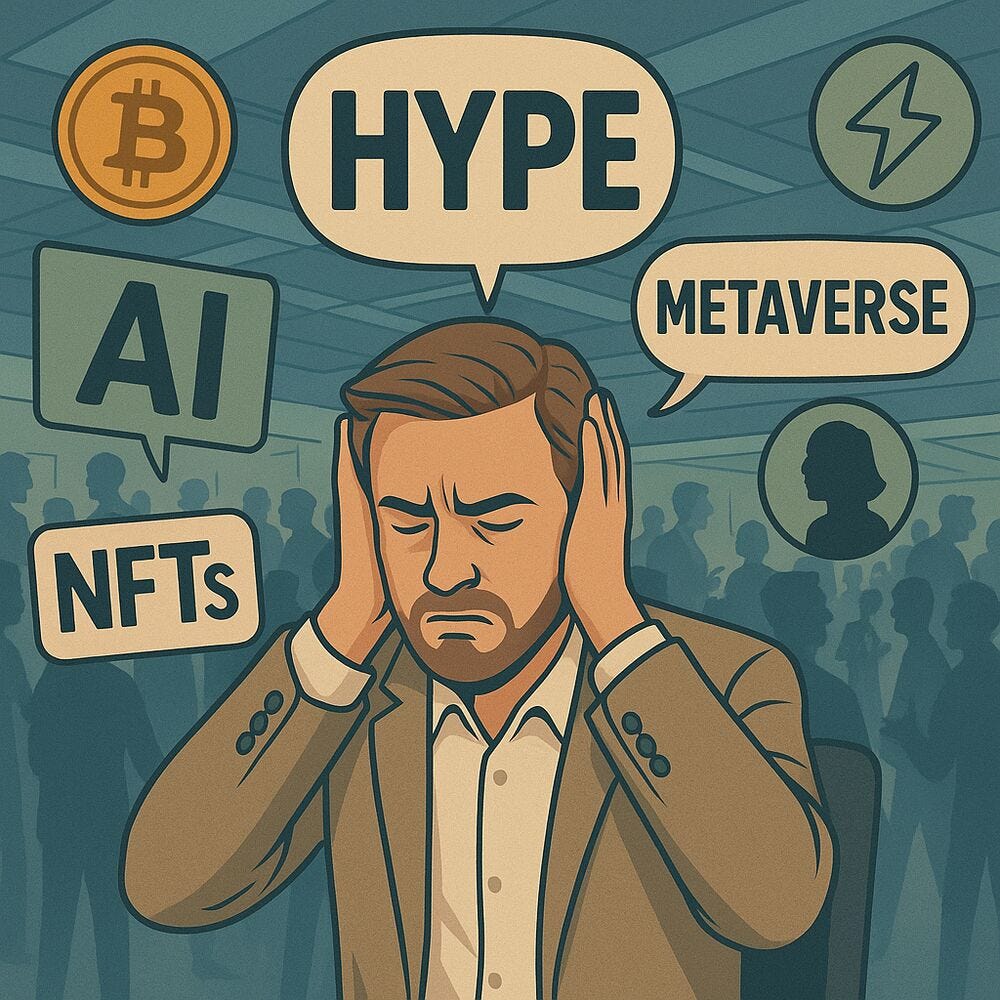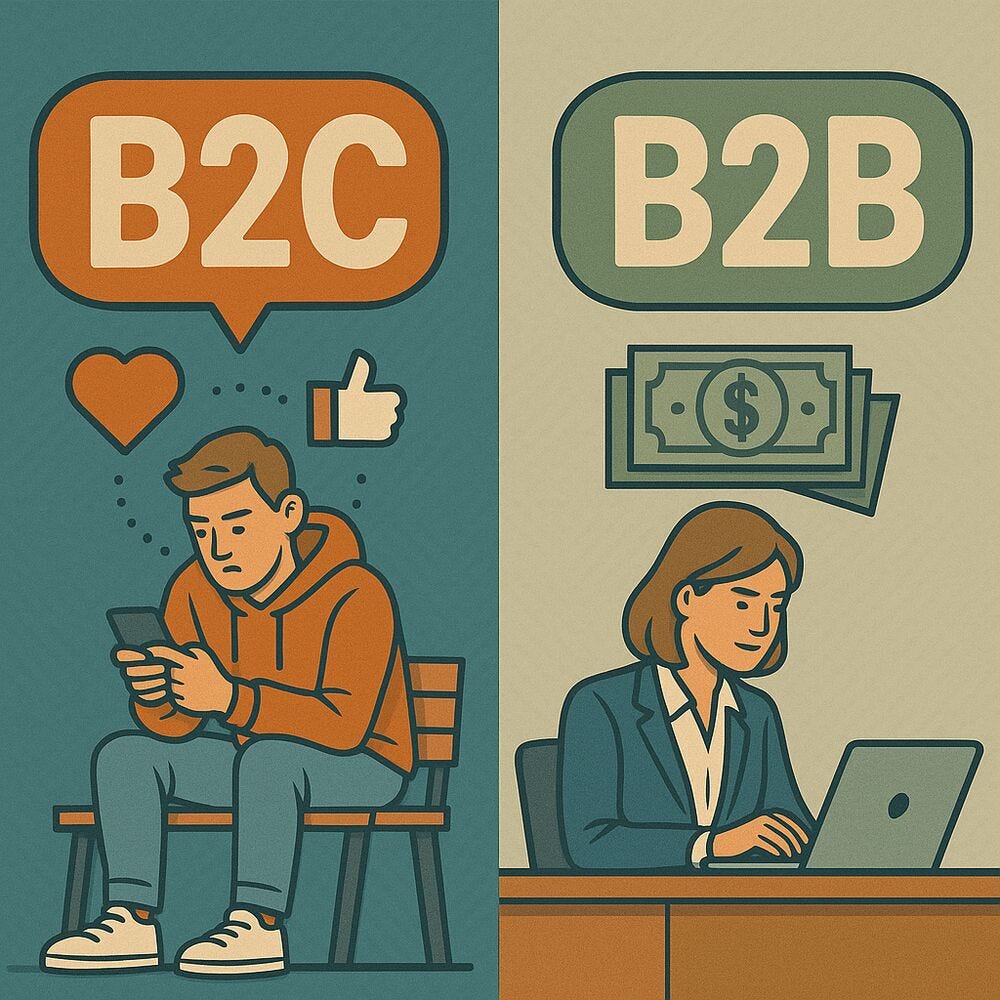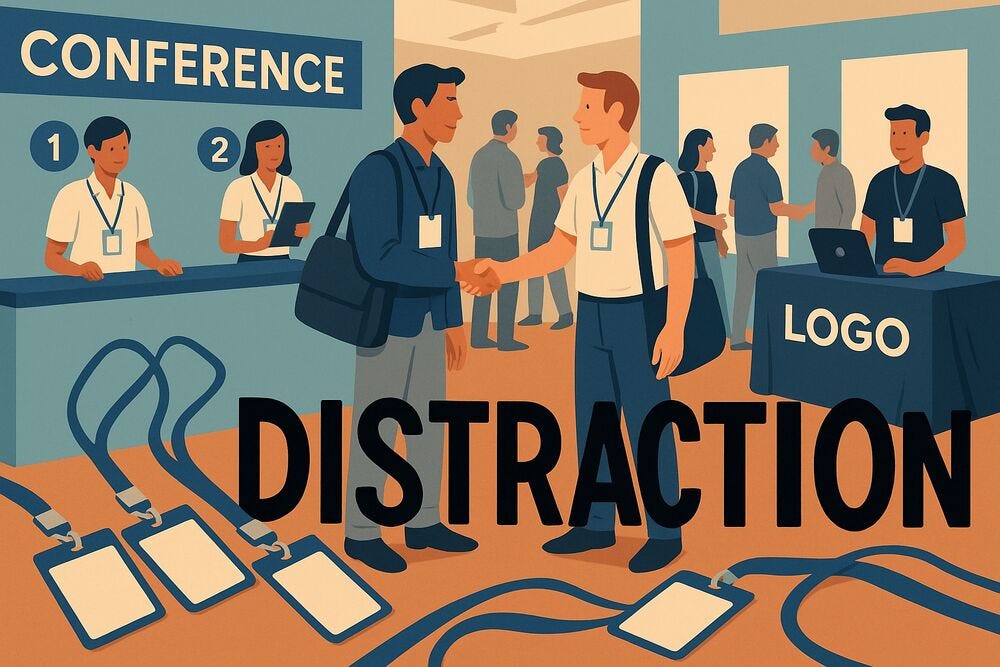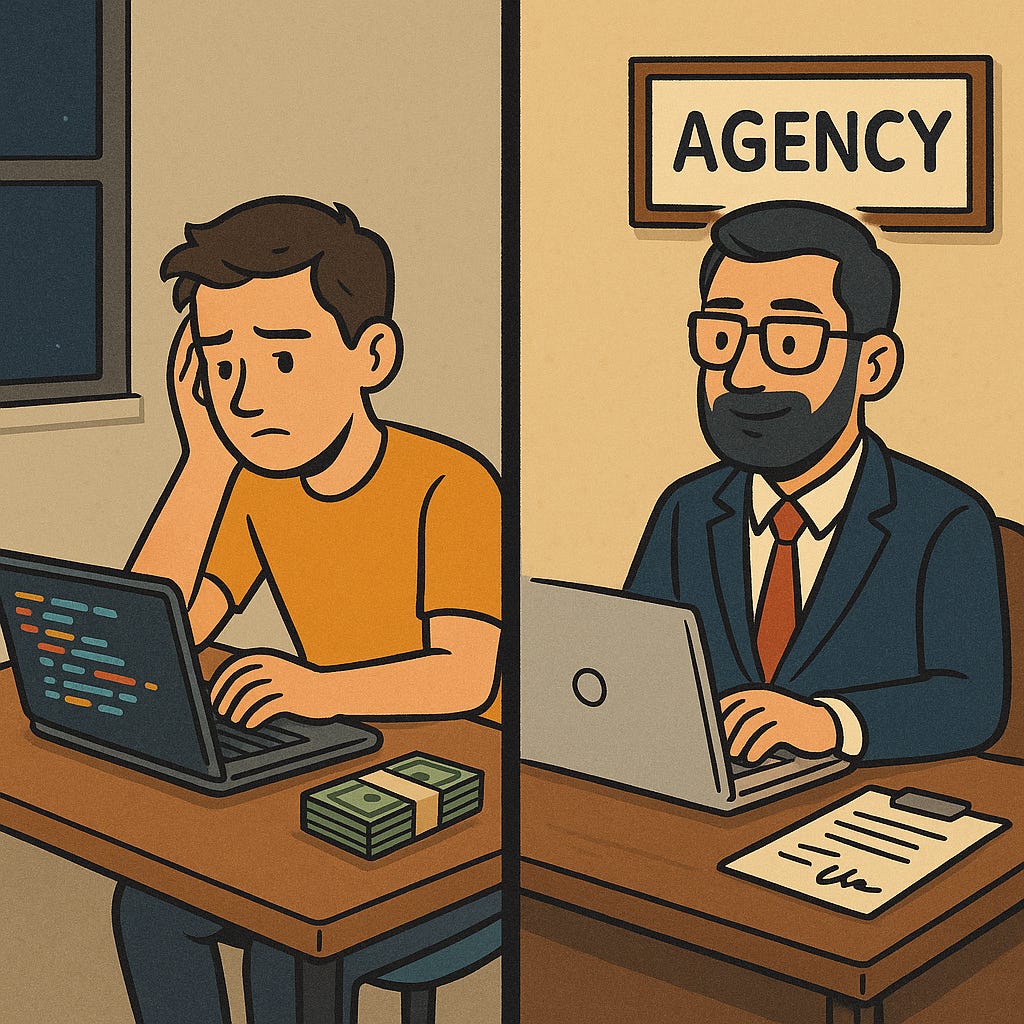Things I Wish I Knew Before 30
You won’t remember the logo. You’ll remember the late nights, the broken code, the co-founder fight, and the features nobody used. Learn from that. Not the fluff.
A list of hard-earned startup lessons I didn’t need to learn the hard way. But did anyway.
By the time I turned 30, I’d burned through a lot — not money, but time, energy, and focus.
I stuck with the wrong projects too long. Said yes when I should’ve walked away. Spent months chasing things that didn’t matter.
This isn’t polished advice meant to impress you. It’s the kind that might sting a little — because it’s real.
1. Validate Before You Build
You can spend years building features no one uses.
I’ve worked at companies where cool design, trendy stacks, and polished roadmaps led to… nothing.
Users didn’t ask for it. They didn’t care.
But leadership didn’t want to hear that.
You don’t need to ship faster. You need to ask better questions — and listen when the answers hurt.
2. Ego Kills More Startups Than Bad Code
It’s wild how many smart people build for praise, not users.
Seen it up close: product decisions made to “look visionary” — not to solve anything.
The work isn’t to impress. It’s to fix something real.
Ego just gets in the way.
3. Users First, Investors Later
Every founder I know who chased investors early... regrets it.
Every founder I know who chased users... got the investors anyway.
No users = no leverage.
No leverage = terrible terms.
4. Skip Managers, Hire Doers
Until PMF, the only people you need are builders.
Designers who ship.
Developers who deploy.
Writers who publish.
Anyone asking “what’s the process?” before you’ve shipped is dead weight.
5. The Website Doesn’t Matter
Use a template. Change the text. Done.
Sales happen in DMs. Zoom calls. Group chats.
Not your fancy hover animation.
In the early days, your product isn’t selling itself. You are.
6. One Full-Stack Dev Beats a Whole Team
I’ve seen it too many times: 5 devs, 3 standups a week, and no working product.
You want momentum? One good full-stack dev and a relentless founder will outrun most funded teams.
7. Go Global From Day One
I’ve worked on products that tried to “start local” — as if bad UX gets a free pass in your home country.
If it doesn’t work globally, it probably won’t work locally either. (Address local differently)
Global mindset = sharper thinking from day one.
8. Do SEO
SEO is slow and boring.
Which is why it works.Everyone’s chasing virality.
Meanwhile, one good post a week for a year = unfair advantage.
SEO or marketing keeps evolving — platforms rise and fall, channels die and get reborn.
But the one constant? People still search for answers.
9. Sell Features Before You Build Them
Here’s the test:
Tell 10 users about a new idea.
If 7 say “cool” — it’s dead.
If 3 say “can I get that now?” — build it.
I’ve seen the smartest teams share half-baked ideas early — through casual user chats, feedback calls, even rough mockups.
The best ideas reveal themselves quickly.
The rest get buried — as they should.
Talk to users before you talk to your roadmap.
10. Hire People You’d Hug
If you wouldn’t go have a beer, solve a crisis, or travel 12 hours with them — don’t hire them.
Culture isn’t perks.
It’s how you feel about that Slack message from them at 11pm or an unscheduled meeting.
11. Bet on Friends
I poured time and energy into every serious startup my friends built — late nights, strategy chats, debugging half-finished ideas. Some of those could’ve become great companies.
But we held back.
Not because we didn’t believe — but because we expected too much from ourselves.
It had to be perfect, big, undeniable... or not worth doing.
We didn’t miss the ideas.
We just waited too long to believe we were already enough to start.
And by the time we figured that out, the moment was gone
12. Post Daily
I started using social media seriously back in 2010.
Reddit karma, niche Facebook pages, weird forums — all of it was organic. No ads, no hacks. Just showing up.
Most people are surprised when they find out.
But over time, that consistency built my own audience — without ever trying to “build an audience.”
LinkedIn (or whatever platform you’re on) is your resume, your distribution, your surface area for luck.
Nobody connects with ghosts.
Show up. Share something real. Do it often.
13. Corporates Will Waste Your Life
They’ll promise pilots, case studies, press releases.
They’ll offer intros, exposure, “strategic alignment.”
What you’ll get:
Email chains.
Shifting priorities.
No users.
14. Avoid the Hype Machine
It’s easy to get pulled in.
The hype is loud. Everyone seems to be making money.
But chasing the shiny thing often means drifting from the real work.
You’ll spend your time in the wrong rooms, around the wrong people, solving the wrong problems.
Hype distracts. It dilutes focus.
Breathe first, protect your attention — it’s your most valuable asset.
15. B2B Over Consumer, Always
Consumer apps = low retention, no monetization, constant dopamine wars.
B2B = smaller market, clearer pain, reliable cash.
One is sexy. The other is sustainable.
Easier said than done, though.
16. Quit Faster
Some projects won’t work.
Some teams won’t click.
Some ideas are just bad.
There can be many variables
Dragging them out doesn’t make you loyal — it makes you blind.
Learn to quit. Fast. Clean. With grace.
That's not a weakness. That’s skill.
17. Conferences Are a Distraction
Tech conferences are networking theater.
Real players don’t need lanyards.
The smartest folks I know skip the booth. They build, they write, they email users.
Want attention? Ship something.
Not stickers.
18. Scrum is Kindergarten for Developers
I’ve worked in teams where scrum was supposed to bring structure — make things move.
Daily standups, tickets, points, sprints — felt like, finally, this will help us execute better.
But it didn’t.
Things got slower. Meetings multiplied. Tasks got over-documented and under-delivered.
The weird part? Scrum gets introduced to solve chaos — but somehow ends up creating more of it.
Like hiring process to replace progress.
Still makes me laugh. The projects didn’t move faster. Just looked busier.
If someone needs daily check-ins to stay on track — fire them.
You’re not running a classroom. You're building something real.
19. Never Outsource Before PMF
No agency loves your product.
No freelancer loses sleep over it.
They’ll take your money. They won’t own the outcomes.
Founders must stay close to the code. Or at least to the people writing it.
20. Bootstrap First
In every company I’ve worked with, the pattern shows up fast:
Bootstrapped teams stay close to users. They obsess over feedback, retention, and actual usage.
Funded teams? They obsess over pitch decks, press mentions, investor updates.
One is building a business.
The other is building a narrative.
And when things get hard — only one of those survives.
The other? Start pointing fingers. The blame game begins.
Bonus: Things Nobody Tells You
✦ Know When to Quit
Perseverance is valuable — but it’s not always the answer.
Sometimes, walking away is the clearer, smarter choice.
The hard part isn’t pushing through.
It’s knowing when pushing no longer makes sense.
✦ Optimize for Energy, Not Time
Track what gives you energy.
Ignore the rest.
Time is a metric.
Energy is an asset.
✦ Co-founder Breakups Are Worse Than Breakups
The earlier you talk about equity splits, exit clauses, and roles — the better.
You don’t want to litigate a friendship mid-fundraise.
✦ You Are Not Your Startup
If your startup fails, what’s left?
If the answer is “nothing,” you’ve built a prison.
Detach. You are a person, not a cap table.
✦ EQ(Emotional Quotient) is the Meta-Skill
Reading people > reading code.
Spotting the bullshitter, the excuse-maker, the passive-aggressive teammate — that’s how you survive year 1.
✦ Health Compounds Too
Walk. Lift. Sleep.
No supplement, productivity hack, or Notion template beats this.
Your body is your bandwidth.
Final Word
You don’t need an 8-figure exit.
You don’t need the press features.
You don’t need to win Twitter.
You need users.
You need clarity.
You need peace.
Everything else?
Optional.
Author: Hawrry Bhattarai




